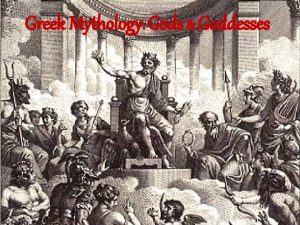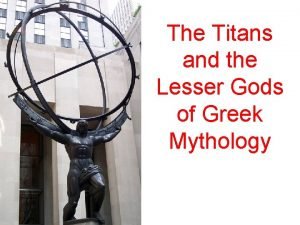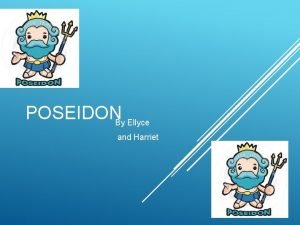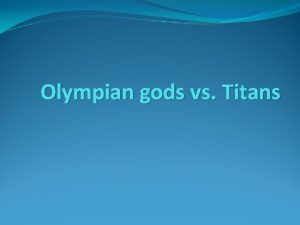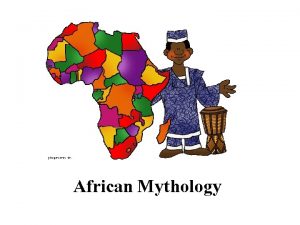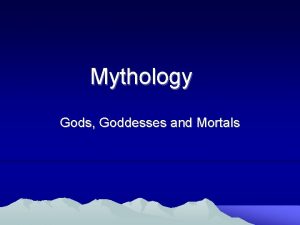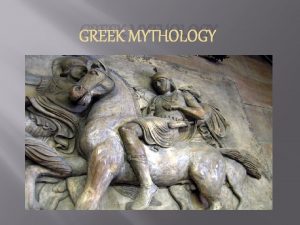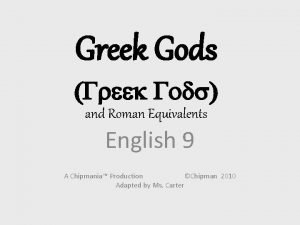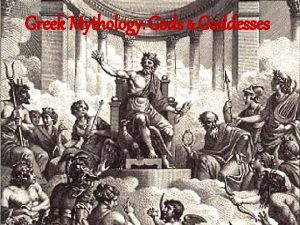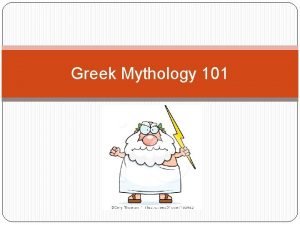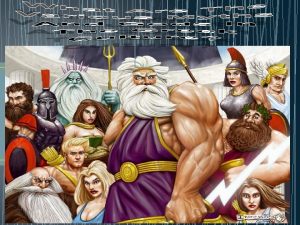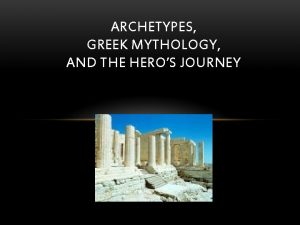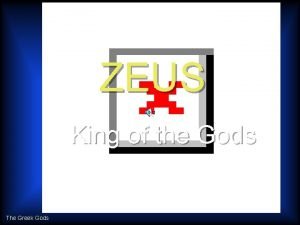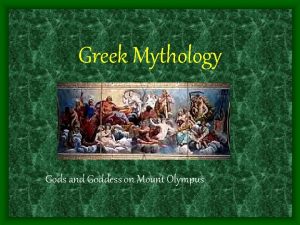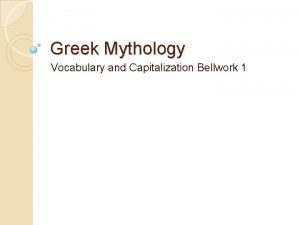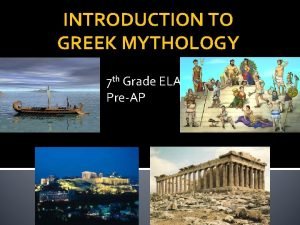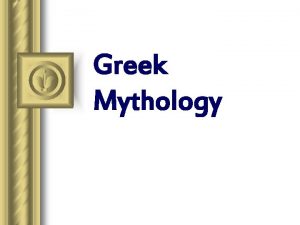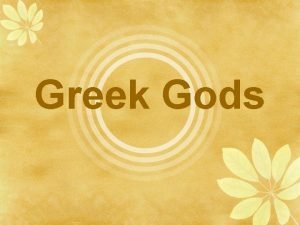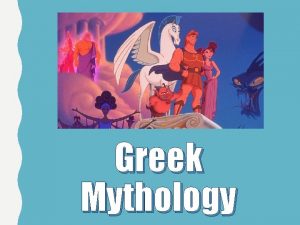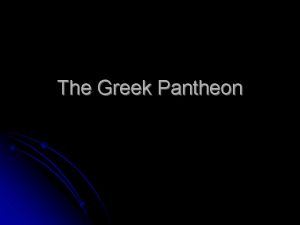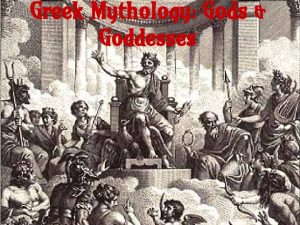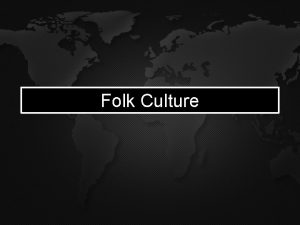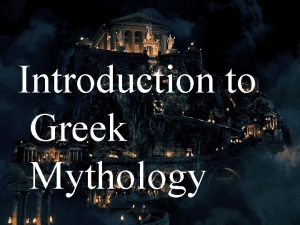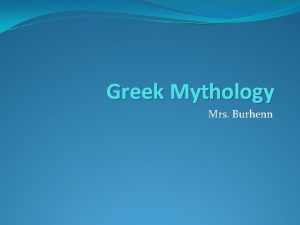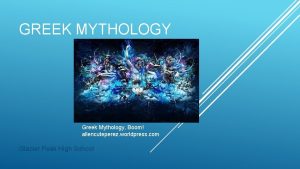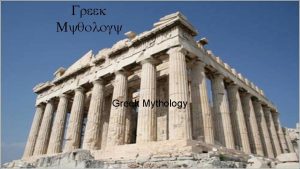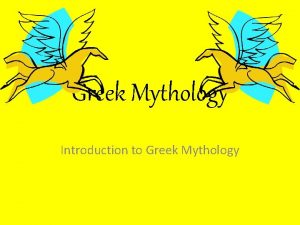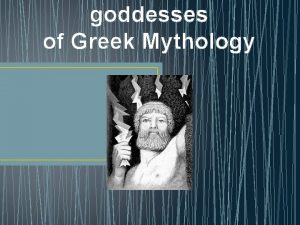Greek Mythology Folk Stories of the Greek gods






















- Slides: 22

Greek Mythology Folk Stories of the Greek gods and goddesses

Where in the world is GREECE? • The capital city is Athens • It is famous for beautiful beaches and sea!

The Ancient Greek People:

Religion and Education Temple of Apollo Oracle at Delphi

What is Greek Mythology? • Greek Mythology is a collection of stories that Greeks used to explain their world. • Greek myths are fiction, but the Greeks believed they were true.

The Greeks and Their Beliefs • The Greeks had many gods. • The Olympian gods were mostly portrayed as physically strong, beautiful and intelligent. • Both good and evil comes from the gods. • Heroes and monsters came from the gods.

The gods and goddesses of Mt. Olympus • Mt. Olympus was the largest mountain in Greece. It was the home of the gods and goddesses. • gods and goddesses were immortal, they could not die. • No humans were allowed on top of Mt. Olympus, but the Olympians were allowed on Earth.

Mt. Olympus

The Greek gods and goddesses

Greek gods • Zeus’s court included scores of subordinate deities who had various responsibilities Poseidon: Sea, Earthquakes Athena: Wisdom, War Apollo: Truth, Light, Music, Healing

• • • Chief god Lord of sky God of thunder & lightening

• Wife and sister of Zeus • Goddess of marriage, protector of childbirth & heroes • Portrayed as extremely jealous and mean

• God of the sea and earthquakes

• god of light, music and poetry • most beautiful god • also the god of medicine • taught people the art of healing • fine marksman • could predict the future

• Zeus’ favorite • goddess of wisdom, strategy, protector of cities and civilizations • goddess of handicrafts and art

• Zeus’ graceful, happy son • Very mischievous and tricky • Zeus’ messenger • Wore winged sandals and a winged cap

• Goddess of love and beauty • Goddess of desire • Wherever she walked flowers sprang up beneath her feet • she appeared from the foam of the sea • Her son is Eros (Cupid)

Homer • Epic: a long poem which tells a story involving gods, heroes, and heroic exploits • Iliad: Greek perspective on the war against Troy in the 12 th Century B. C. • Odyssey: Experiences of the Greek hero Odysseus as he sailed home after the Trojan

The walls of Troy VI In Search of the Trojan War, pp. 74

Troy VI from the North In Search of the Trojan War, pp. 204

Reconstruction of Troy VI - 13 th century In Search of the Trojan War, pp. 204

Trojan War • About 1200 B. C. , the Mycenaeans fought the Trojan War with the city of Troy in Anatolia • At the same time, foreigners invaded the Mycenaean homeland • From 1100 to 800 B. C. , chaos reigned throughout the eastern Mediterranean • In the absence of a centralized state or empire, local institutions took the lead in restoring political order to Greece – City-states The Trojan Horse
 Greek mythology gods and goddesses family tree
Greek mythology gods and goddesses family tree Lesser gods greek mythology
Lesser gods greek mythology All the greek gods and goddesses family tree
All the greek gods and goddesses family tree Titan vs olympian
Titan vs olympian Bulgarian folklore creatures
Bulgarian folklore creatures African mythology gods and goddesses
African mythology gods and goddesses What is the greek miracle in greek mythology
What is the greek miracle in greek mythology Demeter realm
Demeter realm Thanatos family tree
Thanatos family tree Dionysus symbolism
Dionysus symbolism Zeus family tree
Zeus family tree Greek gods 101
Greek gods 101 Tartarus family tree
Tartarus family tree Uranus god
Uranus god Aphrodite realm and symbol
Aphrodite realm and symbol Archetypes greek mythology
Archetypes greek mythology The king of the greek gods
The king of the greek gods Hephaestus realm and symbol
Hephaestus realm and symbol 12 main greek gods
12 main greek gods Do you capitalize greek gods
Do you capitalize greek gods The greek gods
The greek gods Greek gods l
Greek gods l Hades owl
Hades owl
